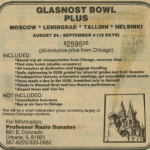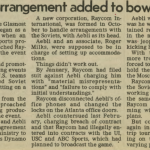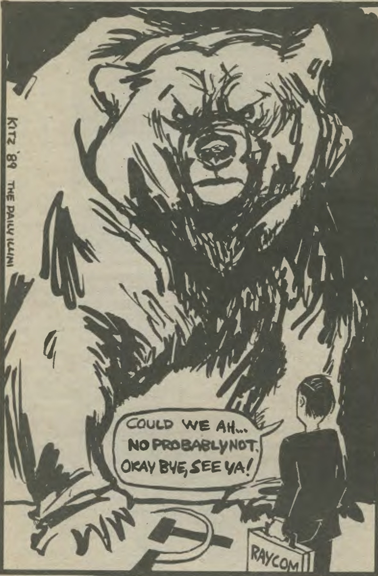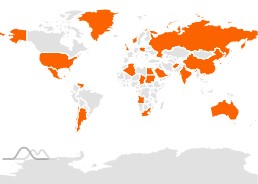Written by Nick Hopkins

The University of Illinois at Urbana-Champaign has put a good deal of effort into promoting its football program. The success of this can be seen in the volume of UI football merchandise across the state, or by simply asking a local Champaign-Urbana resident. One lesser known promotional event in the history of UI football is the Glasnost Bowl, a contest between the University of Illinois and the University of Southern California. This unprecedented event was to be held in Moscow, USSR on September 2nd, 1989 and would have been the first American football game played in the Soviet Union.

The organization of the Glasnost Bowl was agreed upon through a tripartite contract between the University of Southern California, the University of Illinois and Raycom Sports and Entertainment. Raycom, a sports broadcast and event management company, was responsible for negotiating with the Moscow government and setting the game up. In return, they retained sole control over ticket sales in the United States.[1]


However, the Glasnost Bowl never happened. Problems arose in regard to coordination with the government of Glasnost and also due to the arduous task of hosting a college football game in a soccer stadium, as well as accommodating players and their families.[3] Additionally, Raycom had its own internal problems. Raycom hired an independent promoter, Jim Aebeli, with previous experience with American sports events in the USSR to help facilitate the Glasnost Bowl. Aebeli and Raycom were able to secure a preliminary agreement with Soviet sports ministry in 1988. However, in early 1989 Raycom sued Aebeli, alleging he had violated his contract and failed to secure adequate accommodations.[4] Aebeli counter-sued, much to the consternation of UI administrators and the Glasnost Bowl promoters. By June, 1989 the game in Moscow was cancelled.[5] Instead, the Glasnost Bowl was held at the Los Angeles Colosseum on September 4th, 1989, with UI beating USC 14 to 13.[6]

[1]Correspondence Between Raycom and UI Chancellor’s Office. 2/14/1, box 214. University of Illinois Archives.
[2] Glasnost Bowl Brochure, 1989 26/1/5, Box 9. University of Illinois Archives.
[3] News-Gazette Clipping, 1989, 26/1/5, Box 9. University of Illinois Archives.
[4] News-Gazette Clipping, 1989, 26/1/5, Box 9. University of Illinois Archives.
[5]Correspondence Between Raycom and UI Chancellor’s Office. 2/14/1, Box 214. University of Illinois Archives.
[6]Illinois Football Guide, 1990, University of Illinois IDEALS, 89, URL: https://www.google.com/webhp?sourceid=chrome-instant&ion=1&espv=2&ie=UTF-8#q=los+angeles+uiuc+vs.+usc+glasnost+bowl)
